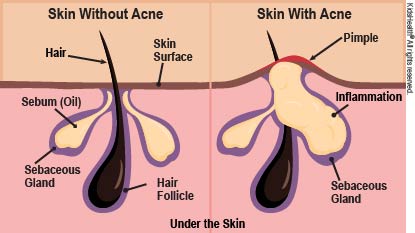Acne is so common that it's considered a normal part of puberty. But knowing that doesn't always make it easier if you've got a big pimple on your face. So what is acne (AK-nee) and what can you do about it?
What Is Acne?
Acne is a skin condition that shows up as different types of bumps: blackheads, whiteheads, pimples, or cysts. Teens get acne because of the hormone changes that come with puberty. If your parents had acne as teens, it's more likely that you will too. For most people, though, acne goes away almost completely by the time they are out of their teens.
The type of acne that many teens get is called acne vulgaris ("vulgaris" means "of the common type"). It usually shows up on the face, neck, shoulders, upper back, and chest.
What Causes Acne?
The hair follicles, or pores, in your skin contain sebaceous glands (also called oil glands). These glands make sebum (SEE-bem), an oil that lubricates your hair and skin. Most of the time, the sebaceous glands make the right amount of sebum. As the body begins to mature and develop, though, stimulate the sebaceous glands to make more sebum.
Pores become clogged if there is too much sebum and too many dead skin cells. Bacteria (especially one called Propionibacterium acnes) can then get trapped inside the pores and multiply. This causes swelling and redness — the start of acne:
- A pore that gets clogged, closes, and bulges out from the skin is a whitehead.
- A pore that gets clogged but stays open, with a darker top surface, is a blackhead.
- If the wall of a pore opens and lets sebum, bacteria, and dead skin cells make their way under the skin, it can cause a small red bump called a pimple. Sometimes pimples have a pus-filled top from the body's reaction to the bacterial infection.
- A clogged pore that opens up very deep in the skin can cause nodules. These infected lumps or cysts are bigger than pimples and can be painful. Occasionally, large cysts that seem like acne may be boils caused by a staph infection.
Can I Prevent Acne?
It's not always possible to prevent acne. But these tips can help:
- Wash your face once or twice a day with a mild soap and warm water. Don't scrub your face hard with a washcloth — acne can't be scrubbed away, and scrubbing may actually make it worse by irritating the skin and pores. Try cleansing your face as gently as you can.
- If you wear makeup or sunscreen, make sure it's labeled "noncomedogenic" or "nonacnegenic." This means it won't clog your pores and contribute to acne. When you wash your face, take the time to remove all makeup so it doesn't clog your pores.
- If you use hair sprays or gels, try to keep them away from your face, as they also can clog pores. If you have long hair that touches your face, wash it often enough to keep oil away.
- If your job puts you in contact with oil — like in a fast-food restaurant or gas station, for example — wash your face well when you get home. It also can help to wash your face after you've been exercising.
- Many over-the-counter lotions and creams containing salicylic acid or benzoyl peroxide are available to help prevent acne and clear it up at the same time. You can experiment with these to see which helps. Follow the instructions exactly — don't use more than you're supposed to at one time (your skin may get too dried out and feel and look worse) and follow any label directions about allergy testing.
- Some people do find that they notice their breakouts get more severe when they eat too much of a certain food. If you're one of them, it's worth trying to cut back on that food to see what happens.
Note: Acne isn't really helped by the sun. A tan can temporarily make acne look less severe, but it won't help it go away permanently — and some people find that the oils their skin makes after being in the sun make their pimples worse.

What Else Can Help?
Sometimes even though they wash properly and try lotions and oil-free makeup, people get acne anyway — and this is totally normal. In fact, some girls who normally have a handle on their acne may get some a few days before their period starts due to hormone changes. This is called premenstrual acne.
Some people get help with acne from a doctor or dermatologist (a doctor who treats in skin problems). A doctor may treat the acne with prescription medicines. Depending on the person's acne, this might mean using prescription creams that prevent pimples from forming, taking antibiotics to kill the bacteria that help create pimples, or if the acne is severe, taking stronger medicines such as isotretinoin, or even having minor surgery. Some girls find that birth control pills help to clear up their acne.
If you look in the mirror and see a pimple, don't touch it, squeeze it, or pick at it. This might be hard to do — it can be pretty tempting to try to get rid of a pimple. But when you play around with pimples, you can cause even more inflammation by popping them or opening them up. Plus, the oil from your hands can't help! More important, though, picking at pimples can leave tiny, permanent scars on your face.
